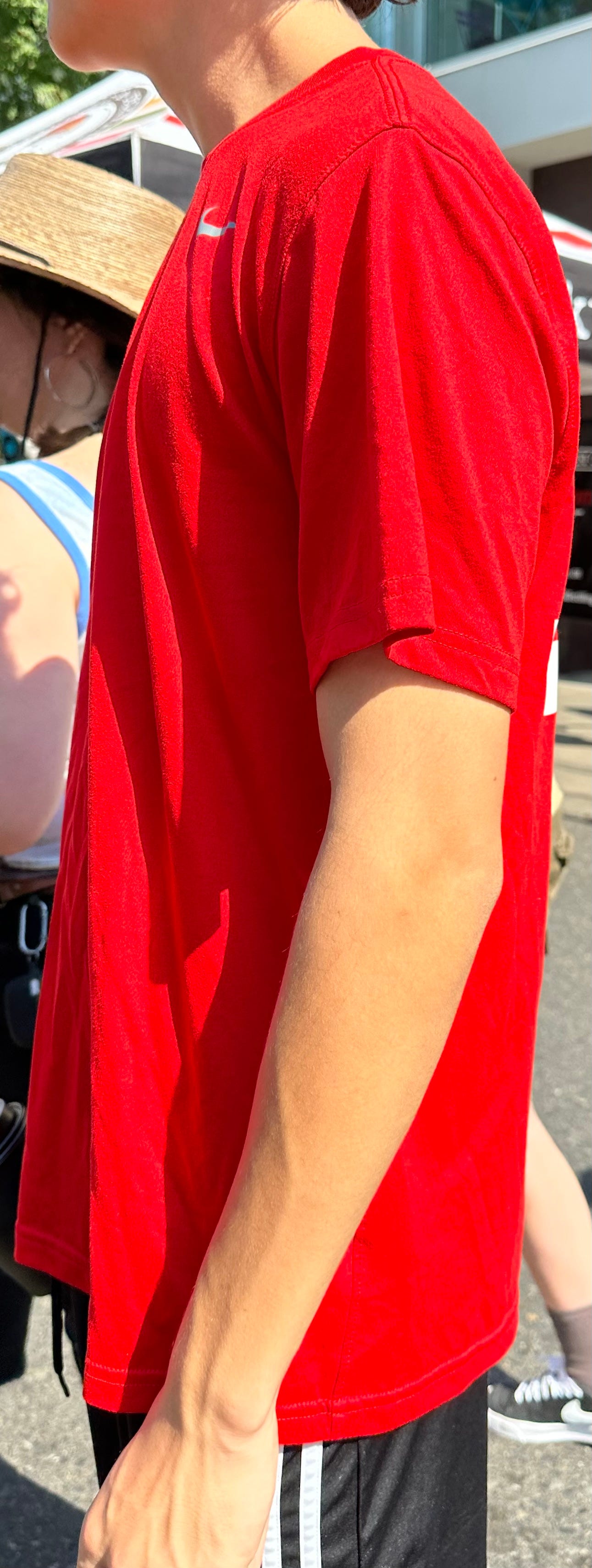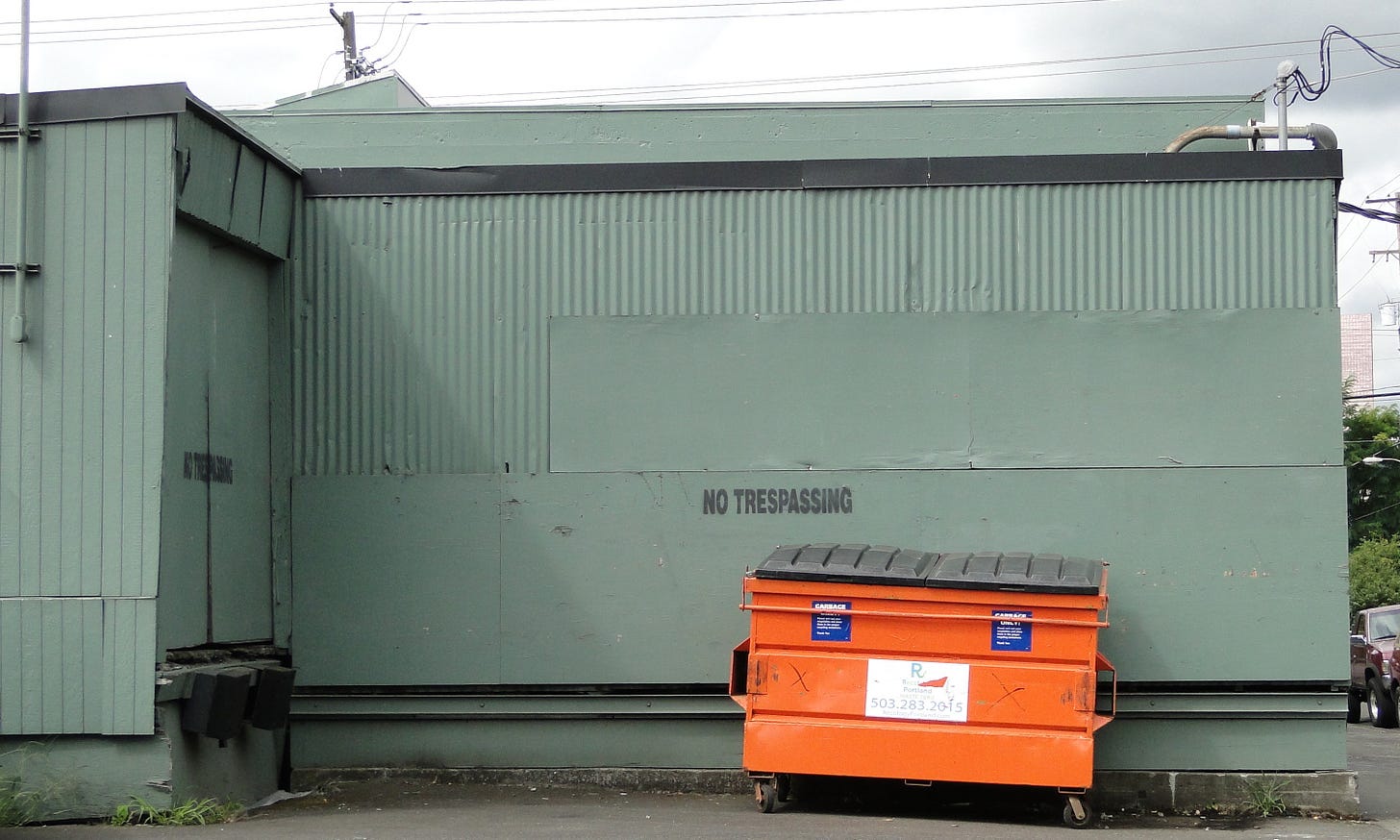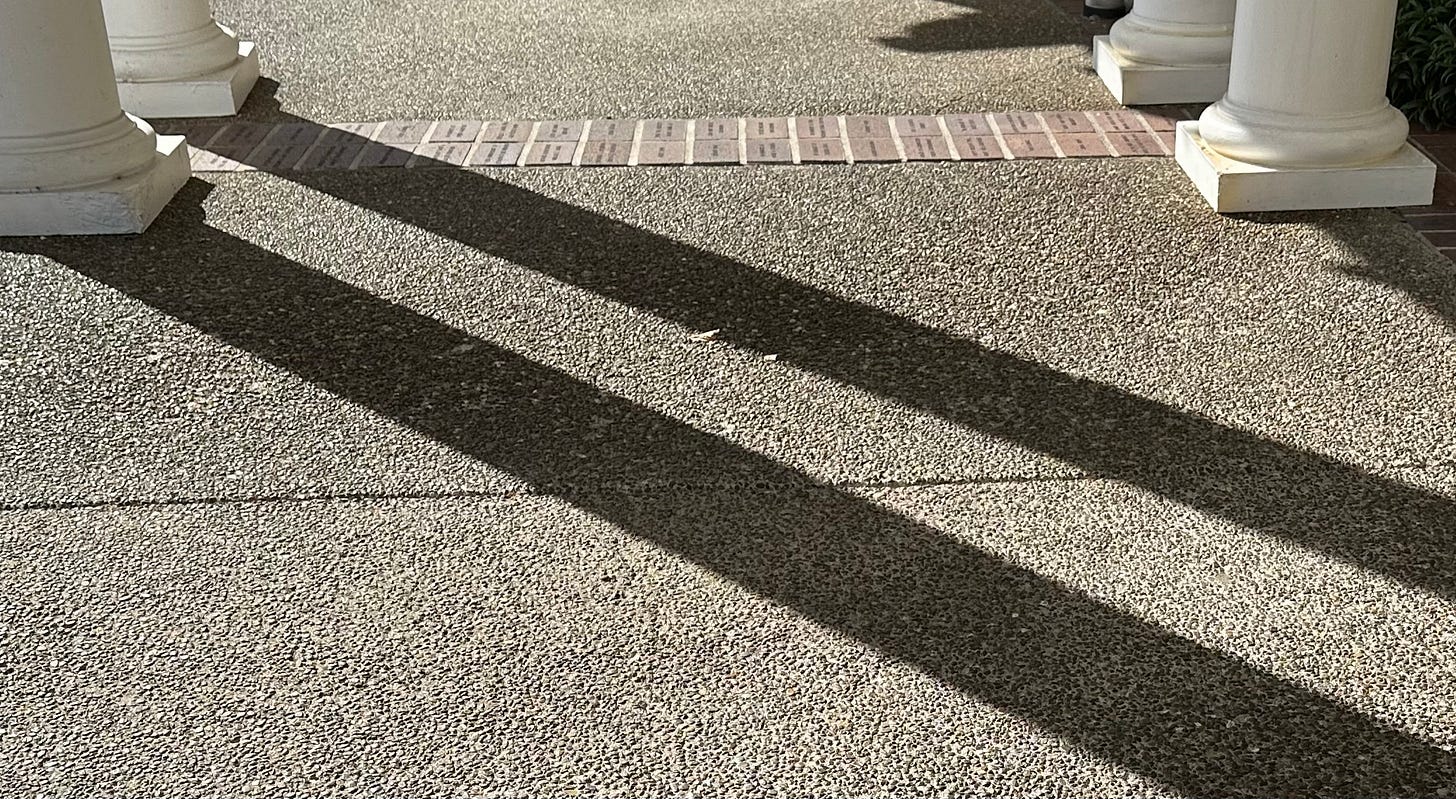In love not with words but with their power
With time for saturated September color, shadows and sun
Tool truck
I was going to say something about fall cleanup, but this image is too fantastic for such a mundane pursuit. I am in love with the pattern of the shovels and hoes, the colors of the rakes. The stark September sun.
Check in
Today is the equinox, the first day of fall.
From today, for six months, darkness will outweigh the light, every day. At Portland’s latitude, the day’s length will shrink from 12 hours today to 8 hours 42 minutes on Dec. 21, the winter solstice.
I welcome the darkness. Somber evenings with soft lamplight instead of a still-lit sky bring me back to myself. Besides, what choice do I have? Reverting to standard time in November just adjusts the timing of the light. Sunlight will dwindle regardless.
Crawl with me into the warm den of winter, where we snuggle together to keep out the chill. I intend to keep writing, my push toward the light.
Moon glow
My friends at timeanddate.com describe the full moon closest to the September equinox as the harvest moon. Harvest moon is unique in that the moon rises close to the same time several days running. The harvest moon will be full next Friday, Sept 29.
Trust
Trust is hard Hard to rely on Hard to understand Hard to make authentic Hard to write a poem about “Trust me.” A lie spans generations. How often we have trusted And been betrayed. Each injury carves a scar. Every scar erodes our spirit. How can we know, How can we trust? Just this. Lean in on Spirit. Rely on your heart. Use your understanding, yes, But trust demands a leap beyond that. And you, only you, can know Whether the leap Is worth the exposure.
Street fair
I went to the Clinton Street Fair last Saturday, Sept. 16. It was the final street festival of the season, and it was the best. More authentic, less commercial.
While I was sitting in my power chair, waiting to write poems, I noticed a young man who seemed about 4 inches wide. A blue T-shirt hung straight from square shoulders over slender hips. Wow, that was odd. But then, I saw another youngster. And another. Thin teens with straight posture, not wide from the side.
Once I started looking at skinny kids, I noticed something well, weird, about the crowd. Almost everyone was skinny. It was like an invasion of ectomorphs.
I saw a few folks with comfortable padding, but none of the really large people one often sees in public, at the medical clinic or the supermarket.
Why all this skinniness? I’ve no idea. But once I noticed it, everywhere.
I wrote poems for people at the Clinton Street Fair. Some of them gave me money!
Vickie and Keyan at the fair
For Vickie, daughter Keyan and Boston terrier Remi
BBQ smoke and coffee.
Will you try my vodka?
Too young? Blow some bubbles,
Scribble chalk on the asphalt.
Little girls dressed as fairies
Dance to a rockin’ beat.
Leaves tremble in sunlight
As summer slips away.
How will we remember this,
A day like no other?
Soon to be just a bead
On the necklace of a life.
Otilia Nunez asked for a poem for her daughterTo Jessica
Your mother loves you Proud of your being Straight and tall, all grown up. Wait for the traffic, Be patient with dogs, Trust that the toast won’t burn. Be your own self, So true to your star. Spread the love, Jessica. Share Otilia’s fierce spirit! (And love your brother)
Color and line
I love saturated color. My favorite combinations are orange and teal, blue and yellow.
I captured this image in 2011 in Portland’s inner Southeast industrial district.
This summer, I found a fountain outside Rieke Elementary in Southwest Portland.
A friend of mine, an artist, sees lines.
I do, too, sometimes. And not just lines but grids. There are so many lines in this image, including the hidden drainage ditch at the right. And many lines converge.
The colonnade outside Rose Schnitzer Manor is curved. When the sun is at just the right angle, the shadows line up with the bricks, like Stonehenge.
When the shadows don’t align, that pattern is interesting, too, with tension in the diagonals.
Take the easy word out
By taking the “easy” word out, I keep myself from taking the easy way out, from defaulting to lazy, flabby words.
Be muscular in choosing words. Take these common phrases.
It was a beautiful day.
The sky was blue.
I enjoyed my walk in the woods.
These are fine words, authentic, true, elegant. But they are plain.
Where’s the life, the tension?
I sit with these phrases, working toward something better.
“It was a beautiful day.” How did it make me feel? Recast. Maybe like this:
“Today turned me inside out.”
There is surprise here, intrigue. How could a day do that?
“The sky was blue.” Yes, and filled with hawks and sparrows, hummingbirds and jays. Each took a piece of the sky home to tuck into the memories of its race.
“I enjoyed my walk.” And more: “The path I walk is coated with elm samaras*—seeds. They filter through the air, backlit by the sun, green-gold coins that clot in the folds of the pavement.”
“Take the easy word out.” I snap the photo in my mind, seeking and seeing, sculpting a better choice.
*I encountered the term “samaras” for elm seeds at foragerchef.com, which includes instructions for hsrvesting and prepping them to eat. Who knew?
When is it poetry?
It’s easy to turn prose into “poetry” by format, that is, arranging words in small groups. What had been a paragraph can become a poem when I hit the enter key.
But poetry is more than that!
Poetry is a concise coffin for a thought, image or feeling. It moves from the mundane by adding unusual language, surprising turns of phrase. A word the reader didn’t expect is dropped like a water balloon, a splash of surprise.
Alive with wonder.
Each word is crucial. It matters how it sounds. It matters which words surround it.
Rhythm matters.
Color matters.
Pattern will ensnare you, force you to find a different phrase.
So, take the easy word out.
Replace it with a hard word, an exciting, vibrant, unexpected image.
A bit more writing guidance
You can take these or leave them, but they have helped me.
Short-circuit reader burnout by paring adjectives, such as “many,” “very,” “a lot.” Avoid squishy, roundabout words like “seems,” “sort of” or “somewhat.”
Avoid phrases that trip too easily off the keyboard, like “rule of thumb,” “tried and true,” “sadder but wiser,” “for love or money,” “avoid like the plague.” These are more than cliches; they are words that have worn ruts in the road of our writing. We could sink in them.
Excise adverbs of motion, unnecessary tiny words—word gnats. Write “kneel,” not “kneel down,” or “stand” instead of “stand up.”
Seek out fresh synonyms. One reader says she’s always looking up unusual words I use. I love that. And it’s so easy to check by highlighting, right clicking and choosing “look up.”
I use the thesaurus sometimes. Age makes it hard for me to hit on the word I want, or I’ve used the same word twice and want to break up the rhythm. It’s a tool. Enjoy it.
Strive to end each sentence with a strong, concrete word or image. Don’t let it dribble to a soft landing.
Above all else, avoid diarrhea of the cursor and the curse of bloated prose. Write lean. Favor the concrete.
Sloppy writing
The signs of sloppy writing are twofold.
Using too many words,
Not doing due diligence to find the exact, expressive, perfect word.
The problem is, we often don’t choose words at all. They come to us, too easily. Your muse is lounging on the sofa, playing cat’s cradle, while you are sweating serifs. Just flinging the words at the wall. What if they all stick? You have a gummy mess, and the reader, yawning, turns the pixilated page.
Word power
Writers like to say “I love words.” But I don’t love words. I love their power. I love how they can interlock into precious significance or scatter their meaning like carelessly tossed birdseed.
Instill discipline. Make the words fit the thought! Make the thoughts worthy of the words!
Finally, I like to break up blocks of gray type. I use subheads. And, of course, photos. A reader with limited time might see a sea of gray type and think, no, not this time, and move on.
Here’s a poem about word choices:
Nothing rhymes with nougat
Nothing rhymes with nougat But rhymes don’t have to rhyme. Lazy rhythms without feet No iambic—still, a beat. Some words fall fallow On infertile earth Like seed tossed carelessly by hand. Some put down roots, Hang onto life— Keep those. Strike hard, Spear the word. Retreat, regroup, Then do it again. Find the rare word Not the easy word Not time to be lazy— Write in blood. Don’t fret over words They will come Unbidden, even, Bourne of nothing. For nothing is the crux, The center of poetry Nothing and everything A riot of words. Clouds and birds’ nests Cobwebs and icicles— These muscular words Came unbidden. Forget the rules: You can be lazy And still be a poet. Words rise like crab pots From an ocean of thought. Yearn, write Yearn, harvest Splash words on the screen. Color bombs. Your reward, Never perfect, A creation That moves you Pulls at your heart. Now you ask: How could I have written that?
Check out
Writer’s block
Every day, I get up raring to write. I don’t put it off; I don’t avoid it. I don’t know writer’s block.
But many creatives do suffer from writer’s block. Sometimes it’s called artist’s block. Being unable to create because the spark won’t catch.
But does all creativity spark the same? Maybe not.
In an earlier life, I loved to bake. And I was always up for it. Nobody complains about baker’s block, though baking is certainly creating.
Or fly-tier’s block.
Or road builder’s block.
Or gardener’s block.
For quilters and sculptors, we’d need a new, block-less term, as quilter’s block and sculptor’s block already have meanings. Maybe quilter’s reluctance. Sculptor’s angst.
At any rate, I have never sat with my head in my hands because I couldn’t come up with a new quilt idea. A quilt already in progress may throw up a roadblock, but that is a puzzle to solve. And I love puzzles.
Back to blockage
So, writers who can’t write, who are blocked. I’m trying to imagine how that is.
Maybe the genre is fiction, characters who aren’t cooperating. Plot ideas that won’t gel. Sitting for days with blank paper or a clean screen, accusing. Shaming.
Shame is one useless emotion. Anyway, I find the bliss of writing forestalls the shame of not writing. I like to write. So I do.
If you are a reluctant writer, there are ways to work through it. What, exactly, keeps you from writing?
Not good enough? Pshaw! Get over that. Get better by practicing. Practicing = writing.
Out of ideas? Take a walk. Open your mind. Open your heart. Let the Universe take your hand and lead you to springs of sweet water, where ideas bob like mosquitos on the surface. Dip some out; they won’t sting!
Take home your new ideas, wet, sopping, squirming.
Tell them to mind their manners. They are yours now.
And you have something to write about.
—30—











Mayhap Xavier Cugat never tasted nougat but he was married to Charo, a different genre of sweet.
Thank you! The photos mean so much to me, so I appreciate that.